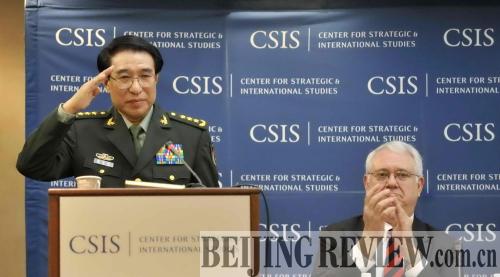|
 |
|
STRATEGIC ADDRESS: Vice Chairman of China's Central Military Commission Xu Caihou delivers a speech at the Center for Strategic and International Studies in Washington, D.C. on October 26 (ZHANG YAN) |
In his 40-minute speech entitled "The Chinese Military: a Force for Multiple Military Tasks" at the Washington-based think tank CSIS, Xu explained the various tasks of the Chinese military—the People's Liberation Army (PLA), China's defense policies and its willingness to establish closer ties with the U.S. military.
"I think essentially General Xu was trying to explain that the PLA is not a threat to other countries and that one of its main purposes is to help its people," Glaser said.
In his meeting with Xu, Gates stressed the need to sustain a lasting dialogue between the Chinese and U.S. militaries regardless of disputes or policy differences, said Pentagon Press Secretary Geoff Morrell during a briefing after the meeting. "This was by all measures a good and productive meeting," he said.
The 75-minute talks generated agreements on seven items for military cooperation, which include promoting high-level exchanges and visits, expanding cooperation in humanitarian assistance and disaster relief, deepening military medical cooperation, expanding exchanges of armies, enhancing mid-grade and junior officer exchanges, promoting cultural and sports exchanges and invigorating the existing diplomatic channels and consultation mechanisms to improve maritime military safety.
"We have increasingly overlapping interests in ways which we can cooperate," Glaser told Beijing Review. She said that there is a lot of interest, particularly involving navies, for more cooperation in humanitarian relief operations. "Perhaps we can also expand our anti-piracy cooperation that is now going on in the Gulf of Aden," she added.
(Reporting from New York) | 